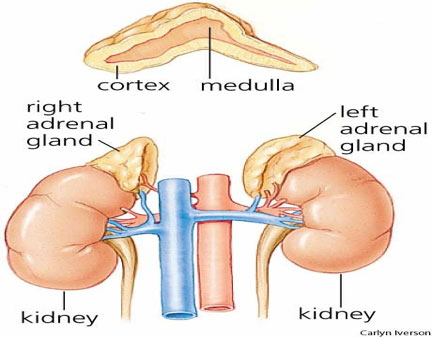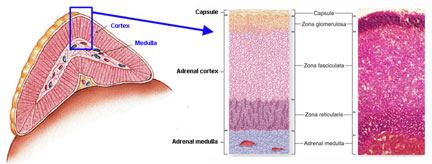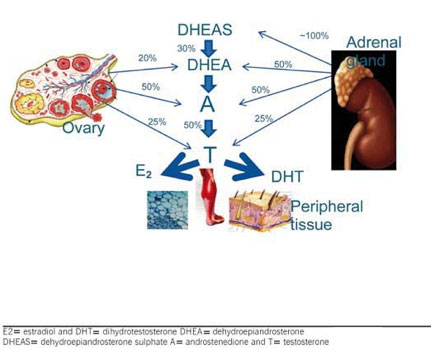The adrenal glands sit on top of each kidney and are about the size of a walnut.
View Products for Adrenal Support
Adrenal Glands
Cortisol has many functions in human physiology.
- Affects bone turnover rate
- Affects immune system response
- Affects pituitary/thyroid/adrenal system
- Affects stress reactions
- Balances blood sugar
- Helps you sleep
- Improves mood and thoughts
- Influences DHEA/insulin ratio
- Influences estrogen/testosterone ratio
- Is anti-inflammatory
- Participates with aldosterone in sodium reabsorption
Virtually all organ systems are involved in cortisol metabolism.
The three main stimuli for cortisol production are abnormal glucose, inflammation and stress. That stress may be emotional, physical or chemical. A four-point salivary cortisol test is essential in any evaluation.
Abnormal cortisol affects many other organ systems. One function of cortisol is to balance blood sugar, so a lack of it may result in hypoglycemia. Cortisol has a major influence on thyroid function. Excess cortisol will suppress TSH, resulting in low thyroid symptoms. Abnormal cortisol will increase the production of reverse T3 (the inactive hormone) and decrease the production of free T3 (the active hormone), again resulting in symptoms of hypothyroidism. Abnormal cortisol will impair activation of the response element that stimulates the beneficial response to all the genes that respond to thyroid hormone.
Excess cortisol will increase the risk of osteoporosis. It will also cause thinning of the skin and increase bruising.
Cortisol plays a major role in hormone synthesis and metabolism. The enzyme that converts testosterone and DHEA to estrogen is called aromatase. This enzyme is increased by cortisol, therefore converting more testosterone and DHEA to estrogen, which increases the risk of estrogen-related cancers.


The zona glomerulosa is where the main mineral corticoid aldosterone is produced. Aldosterone acts on kidneys to provide active reabsorption of sodium and passive absorption of water, which increases blood flow. The zona fasciculate is the site of glucocorticoids production, the primary one being cortisol.
Phase two detoxification involves adequate T3. Since abnormal cortisol lowers free T3 and increases reverse T3, this will result in inadequate phase two detoxification of all substances (including estrogens) that must be detoxified to ensure normal metabolism.
Abnormal cortisol will alter production and metabolism of neurotransmitters, which may result in anxiety and/or depression.
It is well established that the active thyroid hormone (free T3) increases mitochondrial content and function. Since abnormal cortisol increases reverse T3 and lowers free T3, this could result in a decrease in mitochondria by up to 40%, resulting in severe fatigue.
Abnormal cortisol also alters fat metabolism, which increases central body weight gain and stretch marks.
As I have mentioned previously, any organ system doesn’t work in isolation. It is like a giant web; everything touches everything.
A four-point cortisol test is essential in any evaluation.
The innermost layer of the adrenal cortex is called the zona reticularis. This is the area that is responsible for production of androgens (testosterone and DHEA) and estrogens. These hormones are critical in maintaining hormone balance.
The following hormones are associated with normal female sexual function: DHEAs, androstenedione, testosterone, dihydrotestosterone and estrogen.
As shown in Figure 3, look at the importance of the adrenal gland in producing an adequate amount of these hormones.
When the adrenal glands are functioning in an optimal manner, they will continue to produce the hormones as described. When the ovaries begin to fail in late pre-menopause and menopause, the adrenal hormone may compensate to some degree and decrease menopausal symptoms.
The adrenal medulla is the second part of the adrenal gland. It is devoted to the synthesis of norepinephrine and epinephrine. These are collectively called catecholamines. Both hormones are secreted in stressful situations. Catecholamines cause general body physiological changes that prepare the body for physical activities. In case of fight or flight, catecholamine causes:
- Elevated blood pressure
- Increased blood sugar
- Increased heart rate
- Increased metabolic rate
It also affects the peripheral nervous system.

How can anyone expect to have normal sexual function when these adrenal gland hormones are not functioning at an optimal level? Adrenal function and hormone testing are essential for anyone with sexual dysfunction.
When these hormones are functioning properly, they are beneficial to overall well-being. Abnormal function may lead to serious health problems.
In summary, abnormal adrenal function may lead to serious health problems including:
- Insulin resistance
- Obesity
- Hypertension
- Type2 diabetes
- Polycystic ovary disease syndrome
- Atherosclerosis
- Cardiovascular complications
- Dyslipidemia (abnormal cholesterol values)
- Sleep disturbances
- Anxiety/depression
Adrenals depend on Vitamins C and B during times of stress. This supplement contains the entire spectrum of B vitamins to support adrenal, neurological, and stress‐related functions. Results in healthy nervous system, adrenals, immune system, mental function and mood.
AdrenaMend pairs glandulars with targeted nutrients to support the body’s response to everyday stressors. Among the comprehensive blend of nutrients are high-potency pantothenic acid and vitamin C, activated B vitamins, and mineral amino acid chelates.
ALAmed CR helps lowers cortisol. In addition, its biotin supports the function of alpha -lipoic acid in regulating glucose metabolism. This means healthy glucose and insulin levels that are important for adrenal health.
AdrenAdapt helps your body resist and recover from the effects of everyday stress.
MPFF supports antioxidant systems and eicosanoid balance. It is important for healthy adrenals.
Helps with stress on the adrenals due to improper glucose metabolism.
The multiple components of Allergy Control including vitamin C, bioflavonoids, Dihydroquercetin, NAC, Stinging Nettle Extract and bromelain, work synergistically to modulate the cortisol response.
Vitamin D plays a role in adrenal diseases. It helps prevent many health issues such as inflammation, and thyroid conditions that can predispose one to adrenal fatigue.
NAC helps the body produce glutathione, an essential antioxidant. It helps normalize blood glucose levels that are important for adrenal health.
Inadequate methylation can cause adrenal fatigue.
Vitamin C is required for cortisol synthesis.

About the Author
Douglas C. Hall, M.D.
Dr. Douglas Hall, was born in Indianapolis, Indiana on Jan. 30, 1941. He received his BS and Doctor of Medicine at the University of Florida, training in obstetrics and gynecology. Dr. Hall has been in private practice since 1974 and currently has a large practice in Ocala, specializing in OB/GYN and Functional Medicine.

